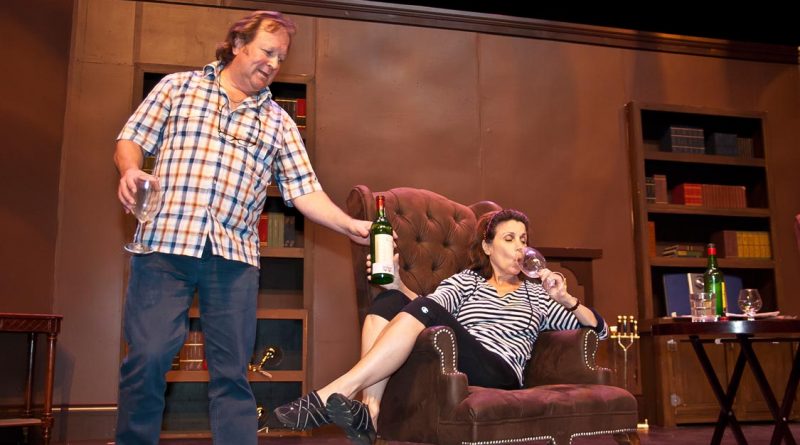This Week In Art/Culture/Entertainment
By John Swartz
Strap in, it’s a long one this week, but I think an interesting read.
Before we get to the main story, I’ve been telling you about the Orillia Youth Centre’s Roots North Music Festival Revisited concert happening September 26th and urging you to get tickets now because they have a track record for putting on a great concert and selling out. Well, the headliner is to be Hawksley Workman.
There will be concert openers announced in due time. The concert will be at the Sunset Barrie Drive-in (Oro-Medonte Line 4 at Highway 11). Get tickets now. They are $35 each, but if you have 3 friends, and you’re going to be in the same car, you can get 4 tickets for $125, which is a discount.
The concert, as in past years, is sponsored, this time by Dapper Depot and Harvies, so all the proceeds will go to the youth center.
![]()



I know What We Can Do, Let’s Go to A Play
For as much as anyone can determine, other than a one-man show happening in PEI, there are no plays being performed by professional actors in theaters anywhere in Canada. August 19 that changes when Norm Foster’s On a Fist Name Basis begins a run at the Opera House.
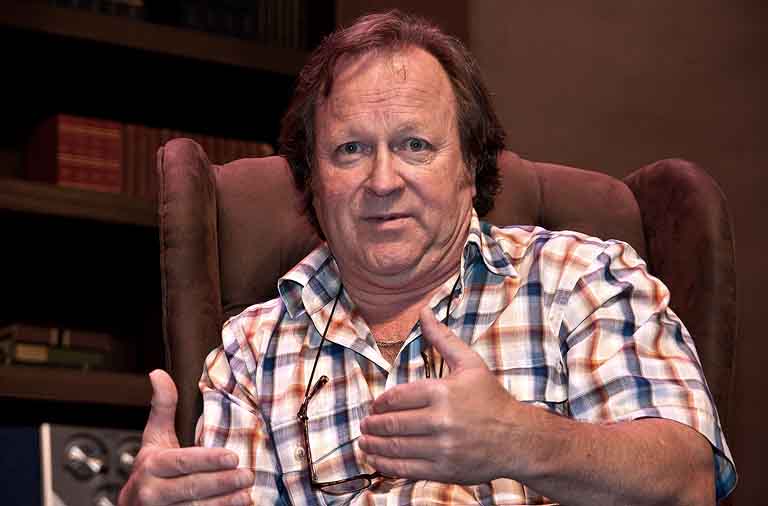
“I talked to Wendy and I said, “we should try and do something that Viv and I can do, a two-hander, very simple, very straight forward,” and Norm had this play I remembered and it was basically, almost by definition, it’s two people that are physically distanced from each other,” said Jesse Collins.
Jesse is the artistic director of the Opera House summer theater, Wendy Fairbairn is the general manager of the Opera House, and Viviana Zarrillo is the other actor in the play (she’s been in several other productions over the years).
Following a change in management at the Opera House and by extension the summer program, beyond a hastily put together first season, each year since the play menu has improved with the choice of plays offered and the quality of the productions and performances. The past two seasons have been outstanding and most performances have filled the 100 seat Studio Theater and suddenly stopping the whole thing and what that could do to the entire thing next year, maybe, or when normal life resumes was not really a topic of thought for this writer other than the fates of out of work actors and stage hands.
So having an established program and audience are factors giving Orillia the opportunity to be the first venue in the country to re-open. It also is the building itself.
“I’ve had weekly Zoom calls with artistic directors from around the province and it occurred to me fairly early on we were in a really unique situation here. Even people that have two venues in their facility, as they begin to move forward, they’ve always been in situations where they’ve been running programs in both simultaneously,” said Jesse.
“What we’ve been successful at over the last 5 years is, first of all, is to have a producing summer theater and there’s not a lot left anymore; a lot of theaters just present – often times they just present our (the Opera House’s) work – but we’ve developed a model where we’ve been able to be in production in the small theater (and) we’ll put a concert in the main space on the Saturday and not run the summer theater.”
Not many will have caught the significance of what Jesse just said. We have a theater company, resident. Other theaters in other communities run summer programs, but they buy their plays and you can see When Harry Came to Town in let’s say Peterborough one week and then catch it in Pembroke two weeks later with the same cast.
Sure people in Brampton, or elsewhere, can see the same play with the same cast and sets a few days after it closes here in Orillia, but those plays originate here. The cost of producing the initial run is money into our economy and those other theaters are paying the Opera House for the performances.
The other factor, the building, is important because the theater is essentially below Gord’s Room, it’s very difficult to run two performances of anything at the same time because sound from one can be heard in the other.
“I think it was just a real determination, a real drive on the part of Wendy, the Opera House, the City of Orillia, the mayor, to have this building not sit empty and be idle. The one thing about the summer seasons is it was always produced in the Studio Theatre. One of the things that makes it possible to us, as opposed to the (other) theaters, is the brilliance of this space and the fact we always produced in the Studio Theater where only a 100 seats could ever be sold no matter how successful it was, and also when the productions were happening in the studio theater nothing was happening up here,” Viviana said.
This is where pandemic rules, and there are many, come into play. At the moment indoor audiences cannot exceed 50 people. Businesses have many more rules to follow in order to operate than you or I do at home. We are also supposed to be limiting our contact with others to what we now call bubbles of close family and friends of 10 people.
“We’re going to be able to, without any change to our business model just move our theater upstairs, physically distance people and it doesn’t really change our model at all,” said Jesse.
Gord’s Room has 700 seats. The ticket selling application has been modified to essentially mark enough seats around a patron’s choice at the time of purchase as sold, creating a minimum distance of 6 feet between bubbles of theatergoers. In this case those you bubble with, your date, your family, can sit together, side by each, but not near another bubble.
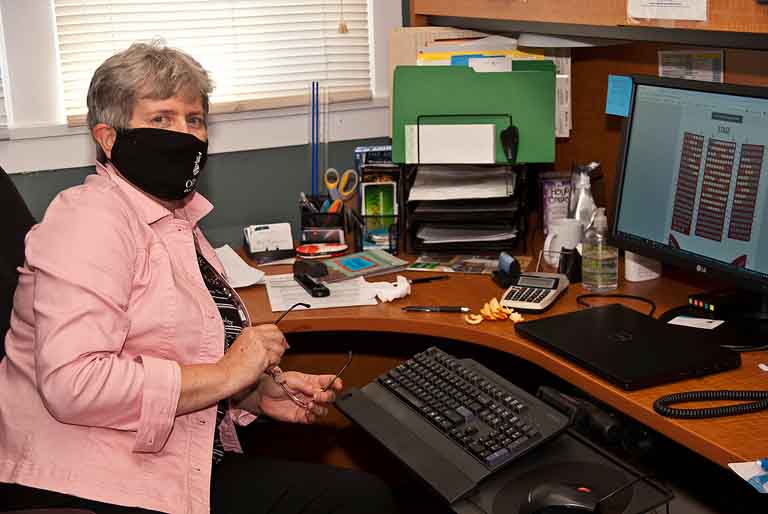
“Whatever your bubble is,” Wendy said. “If I pick this seat here,” demonstrating what happens to the seating layout as tickets are sold, “it automatically, it would bubble around me.” Magically the grey available seats turn to red as they are chosen, and surrounding seats turn yellow, meaning not available.
When you visit the website to buy a ticket, you won’t see it in action, but the nest customer won’t be able to choose a seat near you.
On the website, there is a link for patron rules you will need to read. You will have to wear a mask, do some other things – and you can’t buy a beer beforehand or at intermission, the bar isn’t operating.
“You can bring a cup of coffee, you can bring a water bottle,” Wendy said.
Production Rules
There are plenty of rules the actors and crew have to follow too. Many of them things the rest of us might not even consider, until we decide to put on a show. In this case they are doubly important because our summer theater is a professional operation, just like any of the big ones in the GTA and elsewhere and a lot of people are looking in to see how this works.
“It had to be safe on that side of the house, and the City’s looking after all that and I think doing a terrific job in terms of the way they are approaching it,” Jesse said. “And on our side, we’re unionized. We have Canadian Actors Equity we want to work with and we’ve created a living document about all the steps we are taking, the different ways we’re handling props, the different ways we’re handling dressing rooms and sanitization. We can do it with Viv and I because here we are in our bubble, but we also want to create a template so we can scale up.”
Since April, many performing arts groups and associations have been discussing among themselves how to get back to work and until the province issued some guidelines there wasn’t anything concrete to base a reopening on. Even with guidelines many of those groups are still scratching their heads. To underscore, Jesse said Viviana sent birthday greetings a few days ago to another actor, the reply was,
“How does it feel to be the only working actor in the country?”
The biggest change the company has to deal with is not having a crew. The actors are handling their own props, costumes and makeup, things others would normally do. The backstage space has been restricted in some ways because it has to be cleaned properly every day (and before each performance the entire building) so not all the dressing rooms are open, they have one washroom available, and travel in the building is mapped out to specific routes.
“Lots of businesses have already been doing that. We’re not incapable of doing the same thing,” Viviana said. As an actor, she said union rules for who does what are essentially being applied as they would to a travelling company where actors are also stage hands on the road, rather than the rules which apply to bricks and mortar companies. So in this case, the crew is only 3 people. One of those is the stage manager, Jeff Braunstein. He is a friend of both Jesse and Viviana. He’s been an actor and was in the cast of Viviana’s first stage appearance as a teenager in Guys and Dolls when she lived in Winnipeg.
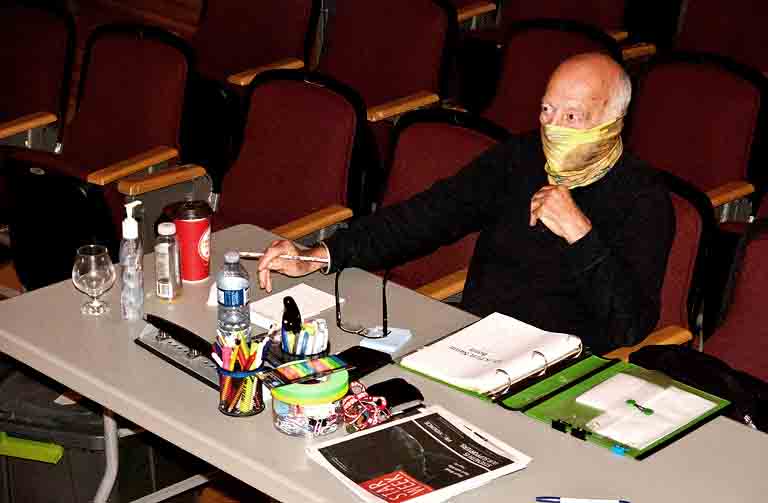
Creating a bubble for work in this case means getting tested and then limiting contact with others for the duration of the production.
“I called Jeff and Jeff said, “you know what? my calendar is open.””
Jeff eventually moved to the other side, production, and has stage managed, directed and produced (he is the founder of Asterix Productions) – and he’s a union guy.
“Jeff was at one time the president of Canadian Actors Equity. The primary thing is safety and I thought, who could I work with that I know would be vigilant about that, help us share that information with the membership of the union so it’s not just us trying to find some secret way of hiding in the corner and doing something,” Jesse said.
So there is a pipeline to the union on how this company is managing work within the rules. Jeff’s taking notes so other companies can follow the lead established here.
“It’s to say to people it can work. We’re saying, you don’t have to shut down completely, reevaluate the way you do theater, but it still can be done,” Jeff said. One of the advantages is the choice of play to perform. “It’s not a very highly demanding script in terms of props, costume changes; it’s a first baby step.”
The Play
They chose to do On a First Name Basis for several reasons, one being virtually all the props are already onstage, except for one bottle of booze, which if anyone saw the production Mariposa Arts Theater did two years ago, is retrieved from the wing by an actor rather than handled by a prop person.
“I talked to Wendy and I said, “we should try and do something that Viv and I can do, a two-hander, very simple, very straight forward, and Norm had this play I remembered and it was basically, almost by definition, it’s two people that are physically distanced from each other,” Jesse said.
The characters have been in close contact for 28 years as housekeeper and employer. The comedy hinges on the employer knowing absolutely nothing about his housekeeper.
“Norm wrote the play for himself and an old friend, Patricia Vanstone, to do together. The ones he writes for himself tend to be great. Knowing Norm as well as I do I have a sense of what he writes for himself.”
“When I read it, it struck me they’re (the plays Foster writes intending to act in) deeper. They don’t make you think, they just give sort of a deeper experience than just a barrel full of laughs.”
The Bigger Picture
This is about getting back to work at the core, leading the way on how to do that secondarily, but there is motive affecting the community beyond the front doors o the Opera House too.
“It’s such an economic driver for so many communities. We hear about the multi-millions of dollars that Stratford generates for Stratford and Shaw generates for St. Catherines, we understand that, but what we often overlook are smaller theaters like ours and many successful theaters around the province, dozens and dozens of them, that are incredible economic drivers for communities,’ Jesse said.
On average, 5,000 tickets are sold per season. Many of those are bought by tourists. It may not have the sudden impact economically of a Mariposa Folk Festival, but it is important just the same.
“We time release them a hundred at a time for three months and they’re in the restaurants, in the stores, they’re coming and going – they’re the best restaurant customers in the world because they have lots to eat and drink and then they leave before 7:30 so the table opens up for other patrons,” Jesse said.
And it puts a few more paycheques back into the economic stream. Box office personnel and other staff on show days get to work, and while the full complement of technicians isn’t back to work, one has been since production began July 29. Claude Lebrecque is running all the lights, sound and other technical matters by himself. With a number of concerts scheduled for September, he’s also learning how production will work for those.
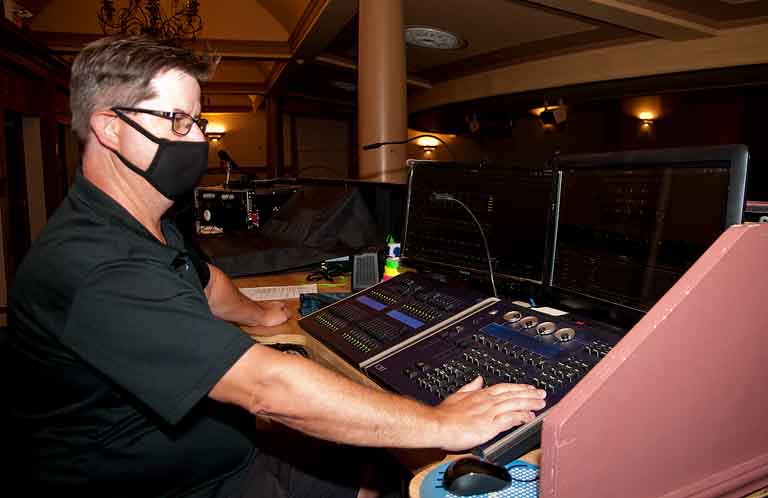
“At least it’s going to give us some kind of basis on starting something. Doing a concert and doing this is completely different,” Claude said. There are more performers to wrangle and keep in line, and performance factors are different.
“When you are blowing a horn or doing all that kind of stuff is completely different than just two people acting.” Even singing is an issue. He has to figure out what physical distance rules will mean for an audience. They may have to only sell tickets to shows and keep 25 feet between the audience and performers, or install a plexiglas barrier to shield the audience, kind of like the fish bowls sometimes seen surrounding drummers on stage – not because they need to be kept at bay, but to separate sound form other microphones on stage. If that’s the route, at least the third trombones will get a taste of how it feels to be isolated at work.
Lots of people have had the opportunity to do house work while on furlough and Claude did the same. Being a theater technician, he’s adept at building things.
“I built a deck, put up a lot of flower gardens.” But, was the deck construction of the same quality as found on stage, illusion or functional?
“No, the deck is permanent.” People in the house laughed.
Another Pandemic Consideration
One not so obvious issue, which we haven’t discussed yet, is the actors. You can’t just bring in two people, in this case, or more, from different places and throw them together in close proximity, closer than at other places of work. Jesse and Viviana have had that base covered for some time.
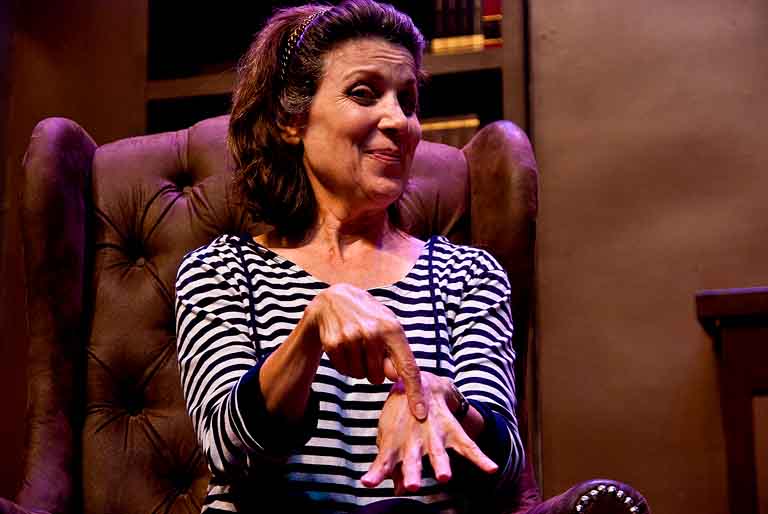
“What I don’t have today, on this hand, is my engagement ring,” Viviana said. They got engaged last October. They’ve been together for 4 years and a trip to Apricale, Italy for her brother’s wedding turned more serious. She said it was a wonderful trip, “then, what a surprise.”
Jesse proposed. He wanted to wait until they visited a fairly romantic place, but a little cafe in the mountains on a nice evening turned out to be the time, and a little anxiety played a part too.
“I was going to do it later in Florence. I had to do it because I was (nervous I was) going to lose it,’ he said of the ring he had made from diamonds from his father’s ring (reset at P.D. Murphy’s).
The Homestretch
Everyone involved feels a sense of weight for what they are doing. This play is the right one to do under the circumstances in many ways. They are carrying the hope for theater professionals beyond Orillia and in doing so may help to keep theater alive into the future.
“It think its being undervalued what is happening in Orillia. What is happening in Orillia is something that’s so very special. We’re not first because it’s important to be first, we’re not first because we’re taking risks. We’re actually following all the guidelines and we’re providing some hope, and as Norm Foster said, “Some light at the end of the tunnel,”” Jesse said. “We are, at the moment, and will be the only Equity production. We are the only working theater actors in Ontario today.”
“People really feel scared about whether they’ll be able to survive past there being a vaccine to the way it was. It’s concern for lots of businesses, especially live performance. If there is any way it can be demonstrated there is a way to do it, you know what? maybe for this season and maybe the next season not only will we make no money or not only break even, we may function at a loss, but if we can do that, we can keep that audience and they can stay invested in this, in theater, in storytelling, in being together in a group, then we will – after that – be able to bring back the economic sense of it all. You can’t abandon it and then it will be there,” Viviana said.
“What an incredible thing for a City to recognize the value. They (buildings like the Opera House) used to be in every town across the province. The will that a community has to say it’s their theater, it’s their place, speaks highly of the value the community places on our magnificent, downtown attraction.
“It’s the best place in the world to see theater, to me. I’ll be there forever. I’ll die in that room if I can. There’s something neat about being here.”
The play will run to September 4. After that there are a few concerts by tribute acts leading up to October appearances by the Stampeders and by the Good Brothers with Sylvia Tyson. Seating will be limited and you can order tickets for the play or concerts online.
![]()



![]()
The Shorts
* Creative Nomad Studios has Meg Leslie and Marg Gurr on hand Friday night at the pedestrian mall demoing the sculptural art they do. The art created during the pedestrian mall art project Metamorphosis by Catherine Cadieux, Pauline Tofflemire, Katheryn Kaiser, Virginia Barlow, Marlene Bulas, Douglas Porter, Cathy Boyd, Paul Baxter, Tanya Cunnington, Stephanie Whalen, Raune-lea Marshall, Dyln Court, and Anitta Hamming is going in the windows this weekend..
* OMAH’s new version of QuarARTine, 6×6 pieces for auction, is up here. There are 20 new pieces in this 4th round and so far the museum has raised $2100 of which a portion will be donated to the arts community. OMAH also has a fascinating new article about Mazo de la Roche here, and has been posting videos on Youtube of the Speaker’s Night’s that would have been. The most recent is about Glenn Gould, and the one before is about a group of RCMP officers drowning on Lake Simcoe. See the whole bunch here. And the gallery is open by appointment, 705-326-2159.
* The annual compilation album, music from the artists who would have performed at this year’s Mariposa Folk Festival, is available. This time its music by Blackie & The Rodeo Kings, David Francey, Dala, Reuben and the Dark, OKAN, and others The vinyl is $40 and the CD $20. You can order them at 705-326-3655. Shipping and taxes are extra. You can save the shipping cost by arranging pick up. They also have some videos to enjoy on their Youtube page, or their website
* The Leacock Museum is open again. Admission is limited to small groups, 5 people max, and you have to call ahead 705-329-1908 to book a tour of Stevie’s old house. The hours are noon to 3 p.m. Monday to Friday. The Bistro is still closed. Swanmore Hall is available for business meetings of no more than 10 people, but is otherwise closed. Check the website for updates and more details.
* The Orillia branch of Dress For Success has a progressive, online, raffle called Toonie Tuesday. Tickets are $2 and you can buy as many as you like. Half of what you spend goes into the pot, the other half to Dress For Success. Jackpots have reached $1000. Check their Facebook page frequently for updates on the jackpot and weekly winners.
* ODAC and the Orillia Museum of Art and History opened nominations for this year’s Orillia Regional Arts & Heritage Awards. The categories are Education in Arts, Culture and Heritage; Emerging Artist; Heritage: Restoration, Renovation and Publication; Event in Arts, Culture and Heritage; and Qennefer Browne Achievement Award. Nomination information and forms are online.
* The Orillia Public Library has a number of things you can do online through their website. They have games and programs to participate in as individuals or in groups. You can download music, movies and audiobooks. You can also take online courses.
(Photos by Swartz – SUNonline/Orillia) Jesse Collins and Viviana Zarrillo rehearse Norm Foster’s On a Fist Name Basis at the Opera House.

